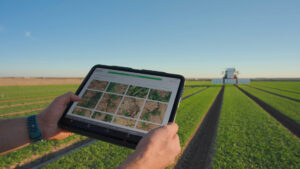The US agtech sector is likely to experience “significant impacts” from tariffs instituted by the Trump administration says a new report from Pitchbook, while Canadian agrifood startups are bracing for impact should blanket tariffs come into effect next month, says the Canadian Food Innovation Network.
Right now, the situation remains fluid, with some commentators arguing that Trump is using the threat of tariffs purely as a negotiating tool and will not impose across-the-board tariffs on its biggest trading partners. However, a 10% tariff on all goods coming in from China is already in effect (prompting retaliatory tariffs on US goods from agricultural machinery to crude oil) and a 25% tariff on imports of steel and aluminum is set to come into effect on March 12, suggesting that the trade war is anything but phony.
The President upped the ante further today with a press conference in which he announced plans to impose reciprocal tariffs [taxing goods at the same rate those nations apply to US products] on numerous trading partners, without giving a firm date.
So what does all this mean for agtech companies?
In some cases, there could be opportunities. For example, firms that provide real-time data, AI-driven risk modeling, and scenario planning could pick up new business as food & ag companies seek to optimize supply chains in the event of a new tariff regime. Some US players in ag drones could also become a bit more competitive as Chinese imports become more expensive, although firms that rely on Chinese components could take a hit.
But stepping back, says Pitchbook, the concern is that tariffs will exacerbate already high input costs for farmers, straining margins and reducing investments in new technologies.
“Increased tariffs on essential agtech imports will likely lead to higher operational costs for businesses due to more expensive machinery, inputs, and technology. This could result in reduced profit margins and may necessitate price adjustments. Companies might also face supply chain disruptions, leading to delays and potential shortages of critical components.”
According to Pitchbook, tariffs on goods from China and other tariff-targeted countries will impact agtech companies relying on sensors, IoT devices, and machinery, while precision agriculture tools and farm management software could become more expensive.
“A significant portion of agricultural machinery and electronic components are imported from China,” notes Pitchbook. “In the EU, high-precision farming equipment and advanced machinery are often sourced from European countries such as Germany and Italy. In fertilizers and agrochemicals, the EU is a notable exporter of fertilizers to the US, while the bulk of US potash [potassium-based fertilizer] comes from Canada. While the US has some potash deposits, mining it in the US is more expensive than importing it from countries such as Canada with large, high-quality reserves.”
Similarly, tariffs affecting seed imports or the raw materials required for seed development could disrupt supply chains and increase costs, predicts Pitchbook.

Canadian agrifoodtech startups on edge
For Canadian agrifoodtech companies, meanwhile, a threatened 25% tariff on goods coming into the US from Canada (set to come into effect in early March if the Trump administration determines Canada has not taken “sufficient action” to address concerns about drugs and illegal immigration) would be “pretty catastrophic,” said Canadian Food Innovation Network CEO Dana McCauley.
“It just seems so wasteful and disheartening,” she told AgFunderNews. “Companies that should be focused on innovation are now having to expend time, brain power and money into scenario planning to deal with tariffs when they could be building stuff, fixing real problems and making real value.”
Having to deal with disruption caused by a pandemic, extreme weather, or overseas conflicts is one thing, she said. But wounds from a trade war—which will likely damage US as well as Canadian companies in the food & ag space—would be self-inflicted.
In the food industry, just as in the car industry, she explained, “So many things go back and forth across the [US/Canadian] border. As an example, I once worked for a company in Montreal making some organic products for US grocers. We would buy some US organic dairy ingredients and ship them to Montreal, make the products here, and then ship the finished products back [to the US].”
Assuming that Canada responds to tariffs imposed on Canadian goods with retaliatory tariffs on US goods, she said, “You’d pay the tariff as the cheese comes into Canada, and then your customer would pay a tariff as the finished product goes back to the US. So all of a sudden, nobody’s making money on either side of the border.”
Scenario planning
Given the uncertainty—will there be tariffs on March 4 or just another round of negotiations?—firms are currently having to game out the “worst, best and most likely case scenario” in the short, medium, and long-term, she said.
“Some [Canadian] startups I’ve spoken to say, maybe we’ll just move to the US? But it’s not that easy, so I’ll say maybe you can find a US toll manufacturer who could take on your production for six or eight months while we see how things shake out?
“I don’t think we’d be able to sustain a trade war for very long without both countries’ economies being really, really badly damaged. So I am really cautioning folks to have backup plans for their backup plans.”
Pitch deck revisions?
From an investment perspective, meanwhile, tariffs could make investors wary of funding Canadian startups that are targeting the US as their primary growth market, she predicted.
“So it’s absolutely time for those companies to think about where else they can do business, whether it’s Europe or Asia. hose markets are obviously logistically more difficult, but we have MOUs with Japan, Australia, the Netherlands, the UK, and Israel. So I think that Canadian startups, especially the food tech ones that are working in global white spaces, absolutely should be getting more market intelligence about those places and revising their pitch decks.”
Further reading:
Canada needs ‘larger and more engaged’ investor base for agrifoodtech: report
Farmers sound alarm on anti-seed oil rhetoric and escalating trade tensions
Tariff whiplash: Uncertainty is driving inefficiencies in CPG supply chains, says consultant
Navigating tariffs and trade in 2025: ‘There will be carnage’





